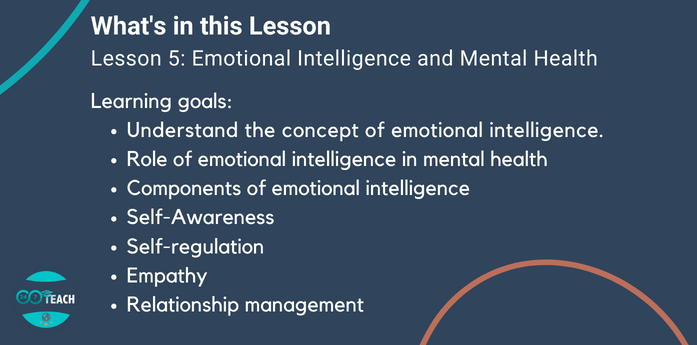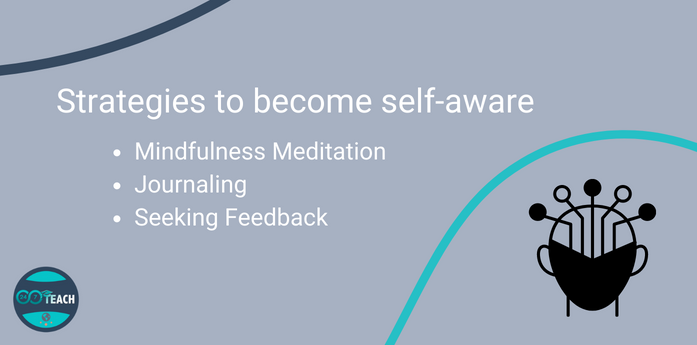Lesson 5: Emotional Intelligence and Mental Health
Prefer to listen to this lesson? Click below.
Please note that this course is designed solely for informational and motivational purposes. It is not a substitute for professional therapy or medical advice.
Workshop Scenario:
Please think of yourself in the following scenario as you complete this workshop.
"Hi! Welcome to the 24/7 Teach mental health and wellness workshop!"..."Before we start, imagine yourself in the following scenario:
Imagine you are working at a company. Working at this company has been both rewarding and challenging for you. The working environment is very fast-paced but you finished all of your projects and assignments on time despite that. But later you noticed something off with you. You suddenly started skipping deadlines and company meetings. You started to forget even minor things. When your colleague saw it, he invited you for a coffee outside the office and suggested that you take off from work and spend some time with yourself to look over your mental health.
Now, you joined this workshop to learn more about mental health and wellness to keep yourself updated about common mental health issues and the ways to avoid these.
In the previous lesson, you learned about personal stressors and their impacts on mental health and Implemented some stress management techniques. In this lesson, you will understand emotional intelligence and learn to develop emotional intelligence skills.
Your objective for today is:
Learners will be able to recognize the role of emotional intelligence in mental health and wellness
Important Questions to Consider While Reading:
In order to be successful in this lesson, you must be able to answer these important questions.
What is emotional intelligence and its role in mental health?
What are the main components of emotional intelligence?
5.1) Understand the concept of emotional intelligence.
Emotional intelligence is all about understanding and managing emotions in ourselves and others. It means being aware of how we feel and why and being able to relate to how others are feeling. With emotional intelligence, we can handle challenging situations better, build strong connections with people, and bring out the best in ourselves and those around us. It's like having an emotional superpower that helps us navigate through life with more empathy, understanding, and success.
5.2) Role of emotional intelligence in mental health
Emotional intelligence plays a crucial role in our mental health by influencing how we perceive, understand, and manage emotions.
It involves being aware of our feelings and those of others, regulating our emotional responses, and empathizing with others' emotions. Through emotional intelligence, we can develop healthier coping mechanisms, build stronger relationships, and effectively manage stress and challenges. This leads to improved mental well-being, increased resilience, and better decision-making. By nurturing emotional intelligence, we empower ourselves to lead more fulfilling lives and cultivate a positive impact on our mental health and overall happiness.
5.3) Components of emotional intelligence
The key components of emotional intelligence, often referred to as the four branches or domains, are as follows:
Self-awareness
Self-regulation
Empathy
Relationship management
Let’s explore these four components in detail: -
5.3.1) Self-Awareness
Self-awareness is about truly knowing and understanding yourself as a person. It's like having a mirror inside your mind that reflects your thoughts, feelings, and actions. When you are self-aware, you can see your strengths and weaknesses, what makes you happy or sad, and what drives you forward. It's like having a little voice in your head that says, "Hey, this is how you're feeling, and this is why." Being self-aware helps you make better choices, handle tough situations gracefully, and build meaningful relationships with others because you can relate to yourself and others on a deeper level. It's like having a superpower that allows you to understand yourself better, and that knowledge can lead you to become the best version of yourself.
Role of self-awareness in promoting mental health well being
Self-awareness plays a vital role in promoting our mental health and overall well-being. By being self-aware, we can recognize and understand our emotions, thoughts, and behaviors more effectively. This heightened awareness allows us to manage our emotional reactions and cope with stress in healthier ways. Understanding our strengths and weaknesses enables us to build resilience and make better decisions aligned with our values. Moreover, self-awareness fosters empathy and improved communication, leading to stronger relationships and social support. By practicing self-awareness, we cultivate a deeper connection with ourselves and the world around us, leading to increased self-esteem, reduced self-criticism, and a greater sense of inner peace and contentment.
Strategies to become self-aware
Mindfulness Meditation: As we already talked about this in the previous chapter, Mindfulness meditation is a practice that involves focusing your attention on the present moment without judgment. Find a quiet space, sit comfortably, and bring your awareness to your breath, sensations, or a specific point of focus. When your mind starts to wander, gently guide your attention back to the present. This technique helps you become more in tune with your thoughts and feelings, allowing you to observe them without getting carried away by them. Regular mindfulness meditation can lead to a heightened awareness of your emotions, thoughts, and reactions, fostering greater self-awareness.
Journaling: Keeping a journal is an effective way to explore your thoughts and emotions. Set aside some time each day to write about your experiences, feelings, and any insights gained. This self-reflective practice helps you process your thoughts and identify recurring patterns or triggers. By looking back on your journal entries over time, you may notice themes or patterns that provide valuable insights into your behavior, beliefs, and emotional responses. Journaling helps you gain a deeper understanding of yourself and can be a powerful tool for personal growth and self-awareness.
Seeking Feedback: Reach out to trusted friends, family members, or colleagues and ask for their honest feedback about your behavior and interactions. Requesting feedback from others can give you a different perspective on how you come across to others and what areas you might need to work on. While receiving feedback can be challenging, it opens the door to self-improvement and increased self-awareness. Be open-minded and non-defensive when receiving feedback, and use it as an opportunity to learn more about yourself and how you can enhance your relationships and personal development.
5.3.2 Self-regulation
Self-regulation is like having a superhero power that helps you control your emotions and actions. It's about being aware of how you feel and managing those feelings in different situations. So, when something makes you angry or upset, self-regulation helps you stay calm and think before reacting.
It's like having an inner voice that says, "Hold on, take a breath, and make a wise choice." When you practice self-regulation, you can resist doing something impulsive, like eating a whole bag of cookies when you know it's not good for you. Instead, you can choose to wait and make healthier decisions. It's like having a personal guardian that guides you to make better choices and handle tough situations with grace and control.
Role of Self-regulation in Promoting better mental health and well being
The role of self-regulation in our mental health and well-being is significant. When we can manage our emotions and behaviors effectively, it helps to reduce stress, anxiety, and impulsive reactions. Self-regulation allows us to handle challenging situations with composure, leading to better mental stability. By resisting immediate temptations and making more thoughtful choices, we promote healthier habits and lifestyles. This, in turn, contributes to improved emotional well-being and self-esteem.
Self-regulation fosters better interpersonal relationships, enabling us to communicate calmly and empathetically. Overall, practicing self-regulation plays a vital role in promoting a balanced and positive mental state, leading to a higher sense of overall well-being.
Strategies to bring self-regulation into your life
Here are three strategies in detail to help you develop and practice self-regulation:
Emotional Awareness and Mindfulness:
Begin by cultivating emotional awareness. Pay attention to your emotions throughout the day. Notice when you feel happy, sad, angry, anxious, or any other emotions.
Practice mindfulness, which involves being fully present and non-judgmentally aware of your thoughts, emotions, and bodily sensations. Mindfulness helps you observe your emotions without getting carried away by them.
When you experience strong emotions, take a moment to pause and breathe deeply. Allow yourself to feel the emotion without immediately reacting to it. This pause gives you the space to respond thoughtfully rather than impulsively.
Develop Healthy Coping Strategies:
Identify your common stressors and triggers. Understand situations that lead to strong emotional reactions or impulsive behaviors.
Once you recognize your triggers, develop healthy coping strategies to manage them effectively. This could include activities like exercise, meditation, journaling, talking to a friend, or engaging in a hobby you enjoy.
Practice these coping techniques regularly, so they become automatic responses when you encounter stressful situations. Over time, they will replace less healthy coping mechanisms.
Set Clear Goals and Boundaries:
Set specific, achievable goals that align with your values and aspirations. Having clear goals provides a sense of purpose and direction in life.
Establish healthy boundaries in various aspects of your life, including work, relationships, and personal time. Boundaries protect your mental and emotional well-being, preventing overwhelm and burnout.
When faced with competing priorities or demands, refer back to your goals and boundaries to make decisions that align with your values and long-term objectives. This helps you stay on track and avoid impulsive decisions driven by short-term emotions.
Remember that self-regulation is a skill that takes time and practice to develop. Be patient with yourself and celebrate your progress along the way.
As you incorporate these strategies into your daily life, you'll gradually strengthen your ability to manage emotions, make wiser choices, and improve your overall well-being.
Learning Checkpoint
Reflect on the strategies to bring self-awareness and self-regulation. Try to implement these strategies and analyze if there is any improvements or positive differences that came into your self being after implementing these strategies.
5.3.3 Empathy
It's the ability to step into someone else's feelings and experiences, even if they're different from our own. When we empathize with someone, we truly understand and care about what they're going through. It's like being a warm and understanding friend, offering a comforting hug when they're sad or a high-five when they're happy.
Empathy helps us be more compassionate and kind to others, showing them that we genuinely care and that they are not alone in their struggles. It's a powerful way to build deeper connections with people, creating a world where understanding and support are always present.
Role of empathy for better mental health and well being
Empathy plays a crucial role in promoting better mental health and overall well-being. When we empathize with others, it helps us feel more connected and supported, reducing feelings of isolation and loneliness. By understanding and validating the emotions of those around us, we cultivate stronger and healthier relationships, which contribute to a sense of belonging and fulfillment. Empathy also enhances communication and conflict resolution skills, reducing misunderstandings and tension in our interactions. Furthermore, experiencing empathy from others can be comforting and reassuring during challenging times, which can help reduce stress and anxiety. Ultimately, empathy fosters a positive and supportive social environment, contributing to improved mental well-being and emotional resilience for both ourselves and those we empathize with.
Strategies to be empathetic
Here are three strategies in detail to develop empathy:
Active Listening:
Pay full attention to the person speaking without interrupting or being distracted by other thoughts.
Show genuine interest through verbal cues like nodding, affirmations, and supportive statements.
Practice reflective listening by paraphrasing or summarizing what the person is saying to show understanding and validate their feelings.
Put Yourself in their Shoes:
Try to imagine how the other person might be feeling in their situation. Consider their perspective, experiences, and emotions without judging or comparing them to your own.
Empathize with their emotions even if you haven't personally experienced the same situation. Acknowledge that everyone's feelings are valid and unique.
Ask Open-Ended Questions:
Encourage the person to share more about their experiences and feelings by asking open-ended questions like, "How are you feeling about this?" or "Can you tell me more about what happened?"
Avoid making assumptions or jumping to conclusions. Instead, allow them to express themselves fully and openly.
These strategies can help you develop and strengthen your empathy skills, fostering deeper connections and understanding with others. By actively listening, trying to understand
their perspective, and showing genuine interest, you can build meaningful and supportive relationships based on empathy and compassion.
5.3.4 Relationship management
Relationship management is all about how we handle our connections with other people, whether it's our family, friends, colleagues, or even strangers we meet. It's a vital part of emotional intelligence, which means understanding and managing our emotions and how they affect our interactions with others.
To be good at relationship management, we need to be aware of our own feelings and emotions and also be sensitive to the emotions of those around us. It's like being able to "put ourselves in their shoes" and understand how they might be feeling. This helps us build trust and empathy with others.
Being a good communicator is also crucial. It means expressing ourselves clearly and honestly while also being a good listener. When we listen actively, we pay attention to what the other person is saying and show that we care about what they have to say. In life, conflicts are bound to happen, but relationship management helps us deal with these conflicts in a positive way. It means finding solutions that work for everyone involved and not letting disagreements damage our relationships.
These skills aren't just important in our personal lives but also in our work or any other social setting. Whether we're leading a team, working with colleagues, or dealing with customers, having good relationship management skills helps us create a positive and harmonious environment for everyone. It's about treating others with kindness and respect and building strong and meaningful connections with them.
Practices for managing your relationships again connect with the other components of emotional intelligence that are explained below:
Practices for managing your relationships effectively
Practice Empathy:
Empathy is one of the most powerful tools for building strong and meaningful connections with others. It involves understanding and sharing the feelings of another person, and it goes beyond just sympathizing with them. To practice empathy effectively:
Listen actively: Pay attention to what the other person is saying without interrupting. Avoid jumping to conclusions or forming judgments prematurely.
Validate emotions: Acknowledge the other person's feelings and let them know that you understand what they are going through. This validation helps create a safe and supportive environment for open communication.
Ask open-ended questions: Encourage the other person to express themselves further by asking open-ended questions that prompt them to share their thoughts and emotions.
Practicing empathy helps you build trust and rapport with others, as they feel understood and cared for. It also opens up opportunities for deeper and more meaningful conversations, fostering stronger relationships.
Effective Communication:
Communication lies at the heart of all relationships, and developing strong communication skills is essential for successful relationship management. Here are some tips for effective communication:
Be clear and assertive: Express your thoughts and feelings honestly and directly, using clear and straightforward language. Avoid being vague or beating around the bush, as this can lead to misunderstandings.
Active listening: Actively listen to what others are saying. Focus on their words, tone, and body language to gain a comprehensive understanding of their message. This not only shows respect but also helps you respond appropriately.
Manage nonverbal cues: Pay attention to your own nonverbal cues, such as eye contact, facial expressions, and body language. Also, be observant of the other person's nonverbal cues, as they can often reveal underlying emotions. By communicating effectively, you can prevent misunderstandings and conflicts, and create an open and honest channel of expression in your relationships.
Constructive Conflict Resolution:
Conflict is inevitable in any relationship, but how you handle it can make a significant difference in the overall health of the relationship. To manage conflicts constructively:
Stay calm and composed: When conflicts arise, take a deep breath and try to remain calm. Avoid responding impulsively or emotionally, as it can escalate the situation further.
Find common ground: Look for areas of agreement and shared interests to establish common ground. Emphasize the points of agreement before addressing areas of disagreement. Use "I" statements: When expressing your concerns or grievances, use "I" statements to avoid sounding accusatory. For example, say "I feel hurt when..." instead of "You always...".
Seek compromise: Aim to find a solution that meets the needs of all parties involved. Be open to making concessions and finding a middle ground.
Focus on the issue, not the person: Keep the discussion focused on the problem at hand rather than attacking the other person personally. By resolving conflicts constructively, you can strengthen your relationships and demonstrate emotional maturity and understanding, which are crucial elements of relationship management.
Closing Assessment:
Select the Assessment button below to answer the following questions:
Identify some challenges individuals might face when trying to practice empathy and communicate effectively. How can these challenges be overcome to foster better relationship management?
Identify potential challenges or obstacles you may face while developing self-regulation skills. How can you overcome these challenges to continue progressing in your self-regulation journey?
Discussion questions:
1. Please answer the following question in the comment section below and interact with learners from around the world.
Explore the relationship between empathy and mental health support systems. How can empathetic support from friends, family, or mental health professionals positively influence recovery and healing?
How can self-awareness be nurtured and cultivated in various settings, such as schools, workplaces, or personal development programs?
2. Please read and reply to other learners’ answers in the forum. Your replies should offer new substantiated ideas or thoughtful questions.














